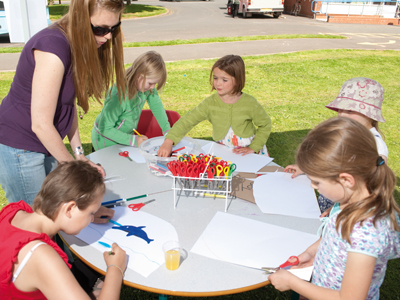Communicating with your Volunteers
Volunteer recruitment forms are an effective way of obtaining the essential information that you need from each volunteer prior to your event. An informal chat/interview with groups of prospective volunteers may also be feasible for you, so you can get a feel of what roles may suit certain people.
An informal chat/interview with groups of prospective volunteers may also be feasible for you, so you can get a feel of what roles may suit certain people.
Volunteers want to make a difference and see the impact they can have on your event and upon your local community as a whole. They should be provided with well defined information regarding their role on the day.
Information
At all times, your volunteers will be representing you and your event, interacting with participants, spectators and the local community and therefore it is essential that they are as knowledgeable about the event as possible.
Once you have recruited your volunteers make sure they are fully aware of dates, locations, start and finish times and have a good understanding of the event in general. One method of ensuring such information is provided is by creating an information sheet, given to each volunteer a number of days prior to the event.
Detail to be covered in the sheet should include:
- Key facts of the event – date, time, location (including map and details of local transport links)
- Meeting point – reporting time, location and the contact details of who they are meeting
- Event overview – event details, how the day will run, the event format, key timings to be aware of and contact details for their team leader
- FAQs – frequently asked questions that your volunteers are likely to be asked by both participants and spectators, e.g. the location of the nearest toilet, start times of events etc – along with the answers most importantly!
- Uniform – any specific items of clothing that volunteers will be required to wear. Providing an event staff t-shirt is a great way to help distinguish your volunteers from participants and spectators, and acts as a memento for those have given their time to help
- Emergency procedures – this includes medical emergencies, lost children, fire and lost/found property. Information must be provided as to how volunteers should react in these situations and a clear line of reporting must be outlined
This information sheet can be generic for all volunteers on the day, with additional role-specific information provided separately once tasks are assigned to each volunteer.
Briefing
A thorough briefing manages volunteers’ expectations of the day of the event, which is important. The briefing should take place prior to the day of the event, providing the opportunity for you to meet your team and cover what the main responsibilities are. It will also provide the volunteers with the opportunity to become familiar with the venue and area in which they will be working.
Rather than an individual being responsible for all volunteers, team leaders working in specific areas on the day could be assigned small groups to work with. These team leaders can be responsible for meeting and briefing their group of volunteers, and can then supervise them throughout the day.
Briefings should be clear and give concise instructions as to what is required of each volunteer on the day. Team leaders can be met in the days before the event and each team leader can then be given the responsibility of briefing their team before the start of the event.










